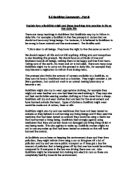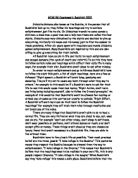In this essay I will try to guide the reader trough the various stages to meditation.
Stratford campus MEDITATION By: Leo Gaviria 21039767-50 Tutor: Angelica de Paiva Course: 1W-NC-EAL-1-1E-SC English 04 April 2003 In this essay I will try to guide the reader trough the various stages to meditation. To reach meditation, you require the three big steps: Relaxation: Control of yourself can mean relaxing your mind and your body You must, control your emotions, your passions, your nerves, your thoughts, your imagination, your desires, your bad habits, your impulses, your aspirations. Control yourself internally. Everything in you should be controlled, so that you can know your forces better, and how to use them It is convenient to control yourself in all circumstances, and mainly, to control your heart, if it is capable of hating or has unhealthy feelings, control your mind, putting a stop to your thoughts and aspirations, the same for your desires and passions, and mainly do not allow it to hurt, even with the intention. Control your soul, feeding it with good intentions and pure and noble thoughts. To control your body, you need to learn how to breathe properly This consists at four steps: . To inhale deep 2. To hold the air (store) 3. To exhale deeply 4. To hold your organism empty. And repeat this for about 4 or more times, every time you have to count at least until 7 for every step. This is a good practice for purifying your blood and
Explain how a Buddhist might put these teachings into practise in his or her daily life
R.E Buddhism Coursework - Part B Explain how a Buddhist might put these teachings into practise in his or her daily life There are many teachings in Buddhism that Buddhists may try to follow in daily life. For example a Buddhist in the five precepts it states that we should not harm any living beings. For instance, it is believed in Buddhism to be wrong to harm animals and the environment. The Buddha said: "Life is dear to all beings. They have the right to live the same as we do." We should respect all life and not kill anything. Killing ants and mosquitoes is also breaking this precept. We should have an attitude of love and kindness towards all beings, wishing them to be happy and free from harm. Taking care of the earth, its rivers and air is included. There are many ways Buddhists might try to carry out this precept in daily life, for example they may become a vegetarian to refrain from eating meat. This precept also limits the amount of careers available to a Buddhist, as they can not have a livelihood such as a butcher. They might consider a job like a gardener, but could not work in an animal testing laboratory or become a vet. Buddhists might also try to wear appropriate clothing, for example they might not wear leather as a cow had been harmed making it. They may also not feel comfortable wearing woollen clothing as it has come from a sheep. Buddhists will
Describe Buddhist teaching about how people should treat the environment and animals.
A) Describe Buddhist teaching About How People Should Treat The Environment And Animals Buddhists care for the environment and some are vegetarians, so the rate of suffering is reduced. They do not think it is right to kill another living thing for money or another person's pleasure. This is a sign of Right (or perfect) intention, from the Eightfold Path. 'Right Intention' is a choice to follow the Eightfold Path, both for the sake of your freedom and eventual enlightenment, but also unselfish love for all beings. Buddhist's believe that they should lead their lives by following the middle way, by only taking what you need and nothing more. In this essay I am going to explore what Buddhists believe about how people should treat animals and the environment. Buddhists believe that Buddhism has a strong link with the environment and animals. There is a Buddhist principle, "the oneness of life and environment". This principle means to take responsibility for everything around us in the environment, and that to make positive changes in our environment requires, a leap of faith. Buddhists believe that nothing has a fixed self and nothing exists without that conditions which form it. It follows humankind cannot be separate from the rest of nature. When looking after the world surrounding we are looking after ourselves. Buddhists believe that everything in the environment is
Buddhism and Buddhist teachings.
GCSE RE Coursework: Buddhist 2002 Siddatha Gotama also known as the Buddha, is the person that all Buddhists look up to, they follow his teachings and try to achieve enlightenment just like he did. On Siddathas travels he came across a sick man, a dead man, a poor man and a holy man these are called the four sights. Siddatha was very disturbed by the sights and decided to give up everything, his family his house and his money just to find the answer to these problems. After six years spent with teachers and monks Siddatha gained enlightenment. Many Buddhists are inspired by this and are also willing to give up everything for their beliefs. All Buddhist have an aim in life and that's to reach enlightenment and escape samsara (the cycle of death and rebirth) To do this they have to follow certain rules and teachings which affect their daily life in many ways, for example their diet, Buddhists aren't aloud to eat after midday. In order to reach enlightenment and go to Nirvana Buddhist's have to follow the eight fold path, a list of eight teachings, here are a few as followed: "Right speech, a Buddhist will avoid lying, gossiping and swearing. They will try not to cause any harm through what they say to others." An example to this would be if a Buddhist were to ask for their life to end this would cause them bad karma. "Right Action, don't harm any living being including
Buddhism and Buddhist teachings.
??????? I think that all of the Buddhist teachings affect them in their daily lives but some affect them more than others. The first teaching that affects their lives is the three marks of existence. These are: * Dukka - all life is suffering, * Anicca - everything changes, * Anatta - there is no soul. Through Dukka Buddhists accept that we have to suffer in life. They are aware that even if they are not suffering themselves, someone somewhere in the world will be suffering at that moment in time. They accept that it's inevitable that they will suffer from things like illnesses, loss of a relative and eventually death. This helps them understand why they must reach enlightenment as this is the only place where they will experience true joy and stop suffering. This will also give them an incentive in life to gain more good Karma and meditate so that they can reach enlightenment. Through Anicca Buddhists learn to accept that all life changes. This shows them that they have to move on from bad experiences and not think about what could have been. This will help them because they won't be yearning for what they can't have. For example if they can't get the job they wanted they will learn to make the most of the job they do have. Change can also be physical, and they will learn not become obsessed with the fact their bodies are ageing and they will accept and be happy with






